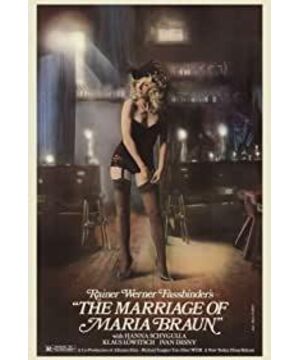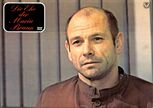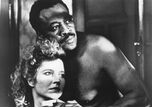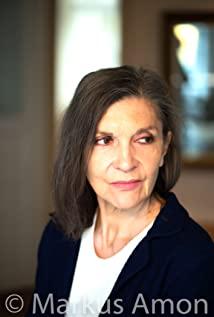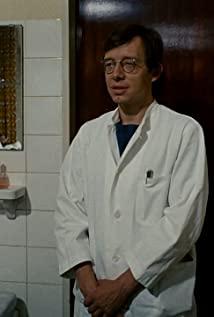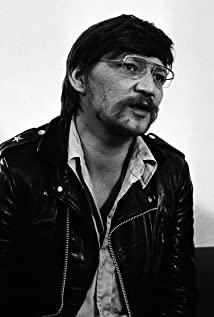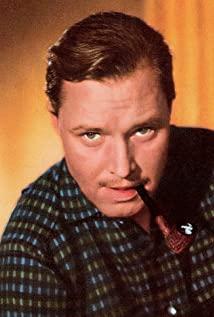Watching this film was not a pleasant experience for me. When Hitler's face and the sound of gunfire break the marriage, we see lines of red curled letters appearing one after another, filling the screen: this is the subtitle of the film. And wait until the last two films are finally screened, and at the end, the gas tank exploded, and the small window of the apartment was covered with red fire - writing this, I suddenly remembered the ten words I disliked a long time ago, "Gas gas" "Can" is one of those words, and I felt the same fear as when I saw the red subtitles at the beginning; not to mention that in the second half, Maria, who was already on the verge of madness, was laughing wildly, while the white-haired woman who answered the phone was Crying bitterly, that kind of smile is really terrifying, as terrifying as a slaughterhouse. So I don't like the film, even though it's composed and elegantly composed, even if it's edited with that glimpse of contempt that characterizes talented artists, I still don't like its core idea: some people have higher rights than others. In a word, privilege. one. In the feature film, Herman in prison makes an inexplicable remark to Maria, which is: "He who serves himself is the Greek equivalent of a manservant." We should note that at this time, Herman Already in jail for Maria, but Maria was standing in front of him sideways, facing the door - she obviously wanted to go, and was already impatient with Herman. Looking at the whole article, Maria's attitude in front of men is also like this: she can leave if she wants to, and stay if she wants to. When she visited the prison, she took the initiative to confess to Herman that she had slept with another man, and she was willing and had no regrets about it. She bluntly stated that she loved Herman spiritually, but physically needed a partner. At the beginning of the film, after losing her husband, she had a dialogue with her girlfriend; her girlfriend knew that she had only been married for two days and had not enjoyed enough sex at all, and Maria also admitted this. So later, in the bar, when Maria was talking about the love in her heart, her girlfriend said that life was real, that everything happened between her legs, and then told her that a black man had already taken a fancy to her, and that was Maria in Her first sexual partner after her husband left her was Bill, an American soldier. Bill gave her the most sincere love, he loved her, complimented her eyes and lips, taught her to speak English, bought a ring as a surprise, was happy with her pregnancy, and desperately wanted to propose to her. But Maria never cared about Bill's feelings, especially after Herman appeared. She was in the foreplay of having sex with Bill, but she went straight to Herman and said warmly to Bill: "Listen! The man I praised to you, Herman, my husband!" She was beaten by Herman She slapped and fell to the ground comically, and Bill's action was that he rushed over to protect her; Herman was busy rushing into the house to smoke, and after smoking, he and Bill got entangled, and then Maria Lift the vase and smash Bill to death. Maria didn't have any stage fright in the courtroom, she said bluntly that she liked Bill very much, but she loved Herman very much; the judge nodded, saying that there was indeed a big difference between the two. Then Herman, who had been listening to this in the dark, stood up and took the murder charge on himself. To be honest, this move strikes me as grotesque, Hermann's love for Maria was not shown in the previous post, he went straight for cigarettes when he got home, which made me suspect that he was taking drugs (in fact director Fassbender He also took drugs and died because of it), and his affection for Maria was never shown, not once. The director chose a gloomy, livid-faced man to play Maria's husband, and Maria's actor was glamorous and sexy, with a bit of Lolita flavor, and her lips were slightly open when she was not speaking, which made me feel that her age was always stuck in adolescence. , her appearance is bloodthirsty, and she also has a little Hillary flavor. There is no husband and wife between them, Maria is beautiful and indifferent, and so is Herman. So what made him sacrifice for her? Is it because Maria recognized him without fear of death by the people in the court? But to go to jail for her for a recognition? Sure enough, the following dangers abound. Maria quickly hooked up with a new man, a rich man, after her husband was imprisoned; passers-by who coveted her beauty ranted to her, and she choked back viciously. Maria lives in a man, or rather, a scumbag (forgive my bluntness), her professionalism and her sexual charm should not be underestimated, she quickly became a subordinate of a rich man and controlled her The company squeezed out the former subordinate who was loyal to the rich man like a loyal dog, and took the initiative, directly and even bluntly invited him to bed with the rich man after dinner, and said to him the next day: "I am now Your subordinate is not the one who made love to you." She was very clear about public and private, like a machine. Even if she went to visit the prison, her attitude towards her husband could be said to be full of maliciousness. She showed him her splendid life outside the prison without leaving any dignity to her husband. "This is me, my life," she said proudly, emphasizing "my freedom." What is the warmth in her heart? Nobody knows. The rich man thought that Maria still loved Herman; for this, he went to prison, met his rival, and they made a deal: that is, the rich man paid to redeem Herman, and Herman Then ignore Maria. Herman had long been in love with Maria at this time. It was cold, he said nothing to the visiting Maria, and turned his back. Maria has since become a little crazy - until the rich man died of illness, she left the money to Maria, not his loyal dog subordinate; he said: "Maria is the person who gave me the most joy in my life... The other half of the inheritance I will leave it to Herman, although his lover is also my love, but only if one can have a great love can one respect the great love of others." Herman's apostasy was presented naked in front of Maria. At this time, she put on clothes shyly, she said to him: "We have only been married for two days, we need to understand each other, when I find out that you are the person I love the most in the world, I will You take off your clothes." Maria then frantically lit the gas tank, the jade and the stone were burned together, and she and her husband died in the fire. two. When Maria read the movie synopsis on Baidu Encyclopedia, I thought it would be a tender, sentimental, poignant and heroic pessimistic love story; but when I watched the movie, to be honest, I was a little confused: why is it so absurd? Why is it so scary? Why is it so funny? I didn't know until I read the director's profile that this expression of deliberately keeping the audience out of the play was Fassbender's style. But I think the most unbearable thing for me is not the style, but the person Maria: she is so scary, she is like Satan, the lion in the Bible, who hunts people around the earth with his mouth open. Maria loved Herman, she said, "I gave you my life." But her performance did not reflect her love for Herman. When the news of Herman's death came, she threw her husband's sign on the tracks. This move is tragic and we should not blame it. But after arriving, Herman has sacrificed so much for her, and she still treats her husband so arrogantly when she visits the prison, so of course. Did she really give Herman her life? ——My understanding of this is that what Maria gave her husband was actually a reason for all the changes in her life. And the reason for this change, although not the whole of her life, gave her the meaning of life. Nietzsche seems to have said a sentence, "People know why they live, and they can live in any environment." Maria is a very cruel woman, hidden under her beautiful lips and strange crazy laughter, I seem to see Seeing her heart, it was a bitter heart, she knew that she was guilty, she knew that she was indifferent, selfish, cruel, and would sacrifice other people's lives in the face of her own interests... But she didn't want to be a For such a person, there is always a child in her heart who is calling and begging for help: "Don't let me be such a person!" That's why Maria needs Herman, or Said she needed love for Herman. This love gave her a reason to live and go on her own way. She knew very well in her heart that even if there were no other men, no prison, no chaos, and no war between her and Herman, she would not really be with him. Her nature made it difficult for her to be nice to others. Yes; however, loving Herman made her feel a little warmer in a life she felt so cold and abominable, and made her feel better. I think that when Maria was on the bed with other men, when she was disdainful of Herman in prison, there should always be a little corner of her heart that was sweet, and the sweetness was that she knew her I owe him, and he will always wait for her in that small place, waiting for her to see him, waiting for her call. I read a story on Weibo: a girl from a wealthy family and beautiful appearance, she was polite and polite to everyone, but said bad things about them to her boyfriend. Although she didn't say these words to her best friend, the man thought she He was sick, so he went to the Internet to complain, but he did not forget to tell netizens that she had abortions for him twice, and she was never respected by his family. She cut her wrists, took a cold shower in cold weather, and abused herself. She said to him, "Don't think that I can't live without you, a man with no money like you leaves me with nothing, and I can find another one in minutes after I leave you"... I don't know why, " The Marriage of Maria Braun reminds me of this girl I never knew. Her boyfriend said that she was generous, and she was used to using money to show her love, whether it was love or friendship. And what about director Fassbender? He also has a reputation for being a sadist, but he also enjoys buying expensive gifts for those he loves now, including his mother, who was very cold to him in his childhood, to please them with money and seduce them with fame They—then just when they loved themselves the most, turned away. That's why, when I saw this movie, the first thought that popped into my head about Maria was not "she's really bad" but "she's really not confident". And when I learned about the director's life, I became even more certain about Maria's lack of confidence: it was not reflected in her perception of her own feminine charm and career ability, but in her ability to have love. In terms of her cognition, she is well aware of the indifference and cruelty in her nature, but she doesn't know whether she can really be good to others, or can really give others the most precious thing in herself in her eyes, not her. The body, not her hard work - but, her life. three. Bill Bill, the only gentle man in the whole film. He is not like a rich man, his face is like an old beast, showing the coldness given by money. Bill was a black man, and his love was more like the earth, wet and sincere. Sweat crawled over his dark, fat body. He described his infatuation with her in English. "I'm black, you're white." The color of his skin made him likely to be discriminated against in the Western world, but this quality seemed to make his love for her deeper and more persistent: inferior, wasn't it? So I love you more. But Maria responded to his love by killing him. Bill's performance from beginning to end is inconsistent with his social status as an American soldier who should be higher than Maria. He has not shown his aggressiveness. He even has a low self-esteem towards Herman, feeling that he is not worthy to compete with him. similar. But what if he fought Herman? Maria will only help Herman. He reminds me of Linton in Wuthering Heights, the heroine is completely selfish to both men, the difference is that Linton is suave and civilized, and Bill is dark and primitive. The self-serving heroine kicks away after taking advantage of these two men, which is why I don't like either Wuthering Heights or The Marriage of Maria Braun. Four. Herman Herman's face is not pleasing, a cold blue face, like a drug addict, in fact, he may indeed be a drug addict. His love for Maria showed nowhere other than in her prison, but that was enough: isn't it enough that sacrificing liberty for another could risk sacrificing life? But I still think Herman doesn't love Maria, he is more like Maria's shadow than Maria's lover: Maria's murder for her husband and Herman's wife's imprisonment are actually very similar-they are both If you want to sacrifice for love, you want to make an honest and bright move. But their love is not enough, not even the energy to warm their own blood. This love can only burn for such a tiny moment, making them risk their lives and do crazy things - in fact, it is very likely that these people themselves They didn't love their own lives very much; and when the tiny moment passed and the love went out again, Herman and Maria's hearts were still thousands of miles apart. So, when Maria finally put on her clothes, she said she was going to get to know her lover again, which was a big truth. They don't really know each other and don't really love each other deeply enough. There is another important difference between Herman and Maria: that is, Herman has experienced war, he has seen real death, the horror of death makes him yearn to escape, and it is said that many wounded soldiers because of the morphine in painkillers Also started taking drugs. In short, the bloody events that have taken place have messed up his brain, at least taken away part of his rationality. Otherwise, he would not always be so cold, so sad, and bitter towards his lover. It is said that a person who has "dead" is more afraid of death and should not be charged for Maria, but I feel that Herman is not really dead, his "death" can only be said to be mentally ravaged , so he was subconsciously afraid of living a normal life, and he took the blame for Maria only because a part of his spirit died, and he didn't know how to live. I even guessed that Herman is actually the stronger among Herman and Maria. Why was Maria always so arrogant to him in prison? Maybe it was because she was afraid of him. We don't know the relationship between Maria and Herman before marriage, but Herman must be stronger, otherwise Maria would not love him that much. And when Herman dies and Maria steals, her body must be happy, although her soul may be miserable - and when she sees Herman back, she immediately kills her lover to please her lover, which is a very, very lowly way of doing. Perhaps it is for this reason that Maria retaliated against Herman later on, cheating on him by publicizing her body. It's just sad that wars and prisons have long connected Herman's spirit with Maria. Parts were smoothed out. So he no longer loves Maria, and he sees through Maria. He ended up choosing reality, not him, with little hesitation. five. The rich man is named Oswald, but I prefer to call him the rich man. A fat, bulging, vicissitudes and shrewd face is not ugly, but the rationality on the face is more like indifference, the understanding on the face is more like the sophistication, in short, this face is no longer clear. the light of life. Compared with Bill's pure love for Maria, the rich man's love for Maria is mixed with a sin. He took Maria into his company and abandoned his loyal dog subordinates. He said that Maria was the person who gave him the most happiness in his life. , is his love really love? It should be, but I think it's more like a kind of self-redemption for him, but he is using opium to redeem himself. Maria had never loved Oswald, which was more obvious than she didn't love Bill, because at least she still liked Bill, and what could Oswald give her but an orgasm and a career? She was more indifferent to Oswald than she was to Bill, who also had romantic words with her in the garden, and Oswald was just her out-of-work sex partner, he was on her It will be extremely painful and clear to see his truest appearance: a middle-aged man, old, sad, and full of fear. I can't beg, he can't be a teenager for a long time, and his soul and body can't go back. The worst thing in the world is not being able to ask, but the "not being able" given by Maria seems to be sweet, so she is opium, and he is drinking poison to quench his thirst. By asking Maria for the love that he will never get, to acquire a fantasy...and this fantasy is likely to be a destructive fantasy. He knew that buying Herman with money would alienate the couple, but he did it anyway. Not only that, he also announced the distribution of his inheritance: all to the couple, it looks very generous; he said "only possible to have a great love, can respect the great love of others", he seems to be doing good deeds! But what was he actually saying? "I'll never have a great love, so I'm going to destroy the 'great love' you all think." The rich man, he still won in the end. He used his money to redeem people's souls. He was extremely happy but not happy to prove that this world is subject to money and power. It is extremely realistic, and love does not exist at all. But he died so painfully. The only person in the world who loves him, an old subordinate like a loyal dog, was driven out by him and didn't get a penny, but he is the only one who really misses him, not Maria. The poor old rich man, who threw away the life-saving medicine, the dull milk, and gave his life like a moth to the fire to the murderous opium, the brilliant poppy: but the poppy is not love, it is poison, though it looks looks like a flower. six. Of the four main characters in the abuse film, the one who most resembles the director himself is probably the rich old man; of course, Maria is more like his female avatar, and Bill is more like his love, his desires, and his life in the real world. Lover (a black actor, for whom he loves), Herman is more like his desperation and his sneer. However, the old man who ruthlessly tore up love for the sake of love was actually him. The name Fassbender just sounds cruel, like a slaughterhouse. I always feel that if a person has to live in a perverted way, there is only one reason, that is, only by using an abnormal way of life can he rebuild the "normal" in his heart, no matter how much it seems to us. Not normal, but that's the source of his life, giving him the illusion of "I'm living as usual". This principle is the same whether it is for the mentally ill, the murderer, the abuser, or the battered. No one really likes the abnormal. What we don't like is just the lack of it. Sickness, fear, pain, despair, these are all defects in the body or soul, but once a piece of the body and soul is torn down, it is difficult to put it back in the way it was, so we are forced to In a quirky way to believe that it was "set back" again, as murderer Henry Lee Lucas said, "I kill like I eat." Almost every murderer has read the Bible , are eager to repent, they can't change, either because of other things, or because they can't. And life still needs to go on rampantly and frantically. In Fassbender, I saw the reflection of Sade: one of the roots of the word "sexual abuse" in English, a man like a living devil who has tried all possible sex and crushed all existing morality. pressure and destruction. Of course, he cannot destroy universal morality, but he can only destroy himself and the people he can influence. Fassbender did the same, let women prostitute to support him, abused actors on set, overdose on drugs, only slept two or three hours a day, drank a lot of alcohol, smoked a lot of cigarettes, and took a lot of sleeping pills... Lao Tzu said, "Be strong. The man who died", Fassbender lived extremely strong, of course, died quickly, at the age of thirty-seven. Sadism is a dark side of human nature. I don't want to say that the abuse is because of love, in fact a lot of times abuse is a desire, it's a distorted appetite and sexuality, I think. Eating satiates us, sex satisfies adults, and abuse satisfies both desires through bizarre channels, but it is not the same as drug use—drugs directly promise and provide great spiritual pleasure, whereas abuse is Physically draining, it throws itself out and smashes at others People, make people feel like a hero for a split second. So what is the relationship between love and abuse? I understand that if abuse has made a part of us dysfunctional, love is to put that part back in, which is to say, love is an energy that restores normality after abuse and masochism. Sometimes it's not energy, it's just ritual, then it's not real love, it's melded into abuse. The weird thing is that with the development of the abuse, the sadist will have a strong and huge love in his heart after he abuses the other party at first, but later this kind of love will become shallower and smaller, and finally "love". Simply a unique form of abuse that makes abuse sweet, and sweet but not happiness. That's when the sadist's heart dries up because he can't find anything to make him feel normal and calm anymore, but the hunger is still there, the abuse doesn't stop, it just gets worse and worse , until total death and destruction. But even so, love does not really disappear. When we don't love others, we still love ourselves, but we no longer know what reasons to love ourselves. At this time, the heart of the suffering person will be desolate, and the craving of the crazy person will perish. seven. After expressing the realization of these, we will look at Spinder's film again, and we will find it remarkable. The way he tells it is strange: it incorporates a lot of melodrama. Clips too. Sometimes loud music starts playing suddenly, or the picture is torn to the next scene before a line is finished, and the explosion sound effects are used deliberately to give people a feeling of tension, excitement and anxiety, and the whole movie even has a kind of fat. texture. The popularity of melodrama is that it can please people, but using these plots in tragedies and dramas can make people feel uncomfortable. It is more than irony, but attack: the director is trying to make the audience's daily life. Cut open to let them see the absurd and ridiculous things in him, but these are also horrible things in himself for the director. In short, the positive values of greatness, sublime, beauty, and kindness were torn up because of this. The only new positive value was not established through his hands, but was reflected through the sadness after these values were torn up—— Sadness shows that you still love yourself, and self-love becomes the last remaining positive value. And why not simply take out the sadness and share it with the public? Want you to know how pitiful I am, how lovely I am? I don't believe that Fassbender, who likes to be loved and noticed so much, has never done this. He seems to have acted in a movie of his own. However, at least in "Marriage of Maria Braun", there are not many emotional colors, or it is not the kind of gentle and comfortable emotional color that most audiences, including me, can like. He is also lyrical, But it's secret: he doesn't want people to empathize for him. why is that? I think, take out your wounds and tell others, and then say, "You have pity on me!" - a person with enough broad-mindedness, like Dostoevsky, has the confidence to do that. Otherwise, the injured will lose their dignity, because in the end what they want is not dignity, but longing for the love of others. seven. Narrative Finally, let's talk about Fassbender's narrative: the upper and lower films, combined into one, with Bill's death and Hermann's imprisonment as dividing points. The whole play shows the life course of Maria Braun from marriage to death, all of which are turning points, and the turns are very hard. I think the director himself knows that this is not a movie that is easy for people to understand, and there is almost no sense of flow. Just like clusters of fireworks, they use explosions and flamboyant fires to break people's nerves, and let the audience enter this film through the pain and pleasure they constantly release: the pain lies in the emotional sharedness between the audience and the heroine. Injury, the pleasure lies in the cognitive happiness of the audience when they discover the truth of the heroine's life. All in all, Maria never gets a single real happy moment in the whole film - she must have thought that her husband's sacrifice for her showed that he loved her so much that it would bring her happiness, but she realized it later. is fake. If it is the closest to happiness, it must be near the end, she wants to dress well, she feels that her dignity has finally returned with her love, and everything in the past is not important - but it is not. I remember Mr. Wu Nan once talked about a word, power. This is of course not a force in physics. When I first heard this word, I was very moved by it, but I felt that something was wrong at the time. After reading the theory book, I wanted to share my thoughts: The power lies in the sudden turn of the plot and the discovery at the same time. The audience's interest in the story includes highlights, one is caring, and the other is curiosity. The meaning of power is to suddenly turn around and make you realize "ah, the world is like this", make you burst into a lot of curiosity, and then suddenly start to feel extremely cute and pitiful characters. It's like a short film that Wu Nan recommended to us at the beginning of the class, "About a Girl". The whole film is about a British girl chatting by the river with a slang accent, talking about her life indefinitely, until the end, She threw a package into the water, and the underwater footage showed a dead baby in it, and she said, "It's all over," as if to end a game, and hummed as she walked, all black, and singing accompanied by subtitles. I didn't like the film, just as I didn't buy into the idea of power. The scene where the girl dumps the dead baby is the only plot point in the film, and it sparks a lot of curiosity, followed by concern - but it's very, very contrived. I don't like it because it's not real, it's all tricks. In fact, such a girl definitely exists, but she can't have the facial expression that the director asked the actors to show when discarding the dead baby, so cold, so cold, so indifferent. This coldness is art, but it is not reality. The reality is: life doesn't turn around like that There are so many, and the discovery is not often followed by sudden changes. Life is a bumpy life-you want to say that art is not the same as life? Of course. But art has to be sincere, and sincerity means that you have to show the truth, even if it is the truth you "see", not that you inject your aesthetics into the pictures and figures like a liquid. (Forgive me for using more dashes in this paragraph, I'm imitating Fassbender.) So from this point of view, I still appreciate "Maria Braun's Marriage" more than "About a Girl", It is also possible to identify with Fassbender. His story seems to be full of power, but in fact, it is not difficult to find out when you go deeper. What he is doing is using editing and various absurd techniques to shatter the beauty of power that connects the tight plot points. , to minimize the didactic meaning of the story, he doesn't say anything to you, what he shows you is life: bumpy, confused, like a nonsense, but very serious life in the bones. So, even if I don't like Maria Braun anymore, I still think from the bottom of my heart that this character is real, her emotions, her life choices, everything is real. Her truth is that Maria Braun is like a female version of Fassbender herself. So we can dive in the story, dig into the depths of the sea of blood, the director's trembling heart, it hurts, twitches, the face on it frowns, it stands at the same height as the heroine, it Neither overlook, nor write, nor pity. It is saying: "I am suffering. I am hiding. I am afraid, I am alive, I am loving." Anger, sorrow, her life choices, everything is real. Her truth is that Maria Braun is like a female version of Fassbender herself. So we can dive in the story, dig into the depths of the sea of blood, the director's trembling heart, it hurts, twitches, the face on it frowns, it stands at the same height as the heroine, it Neither overlook, nor write, nor pity. It is saying: "I am suffering. I am hiding. I am afraid, I am alive, I am loving." Anger, sorrow, her life choices, everything is real. Her truth is that Maria Braun is like a female version of Fassbender herself. So we can dive in the story, dig into the depths of the sea of blood, the director's trembling heart, it hurts, twitches, the face on it frowns, it stands at the same height as the heroine, it Neither overlook, nor write, nor pity. It is saying: "I am suffering. I am hiding. I am afraid, I am alive, I am loving."
View more about The Marriage of Maria Braun reviews


